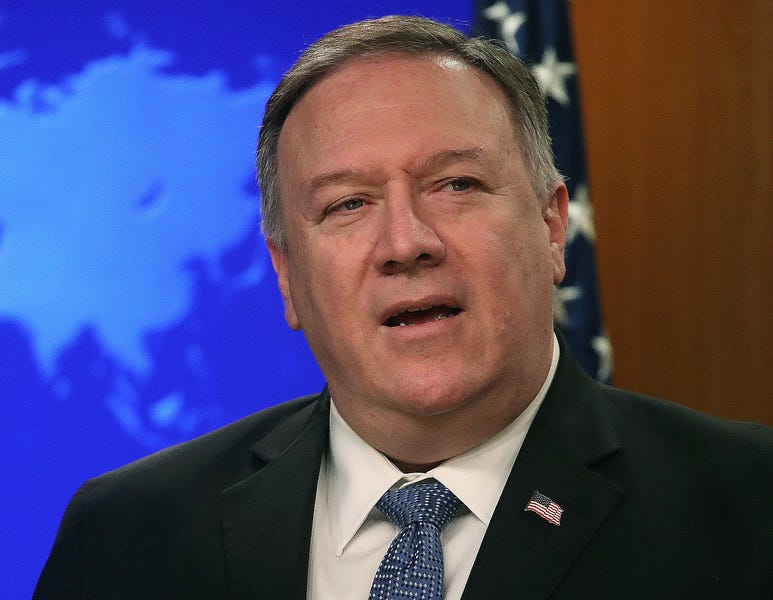On Sunday, 60 Minutes reported that Secretary of State Mike Pompeo “attempted to resurrect a debunked theory that [coronavirus] was manmade in China.” The reporting was quickly disputed by White House Press Secretary Kayleigh McEnany and State Department spokeswoman Morgan Ortagus, while others on Twitter took issue with 60 Minutes’ tweet about the segment, including Sohrab Ahmari, whose take was given additional attention thanks to a retweet from Donald Trump Jr.:
The 60 Minutes segment in question showed clips from Pompeo’s May 3 interview on ABC’s This Week. Pompeo’s comments with interviewer Martha Raddatz on This Week occurred as follows:
RADDATZ: Do you believe it was manmade or genetically modified?
POMPEO: Look, the best experts so far seem to think it was manmade. I have no reason to disbelieve that at this point.
RADDATZ: Your — your Office of the [director of national intelligence] DNI says the consensus, the scientific consensus was not manmade or genetically modified.
POMPEO: That’s right. I — I — I agree with that. Yes. I’ve — I’ve seen their analysis. I’ve seen the summary that you saw that was released publicly. I have no reason to doubt that that is accurate at this point.
RADDATZ: OK, so just to be clear, you do not think it was manmade or genetically modified?
POMPEO: I’ve seen what the intelligence community has said. I have no reason to believe that they’ve got it wrong.
The presentation of this exchange on 60 Minutes can be viewed here:
While 60 Minutes does not include the entirety of the ABC interview in its segment, it provides enough of it to make clear to viewers that Pompeo walked back his initial claim that the virus was manmade. In fact, immediately after showing clips of Pompeo affirming the unproven claim that the virus was manmade, CBS showed Pompeo insisting that he agrees with the findings of the intelligence community that it was not manmade. And 60 Minutes correspondent Scott Pelley emphasizes that Pompeo made both sides of the same argument, noting the secretary “tried to have it both ways” on the claim. 60 Minutes did not “cut out the portion of Pompeo’s remarks where he clearly acknowledges that he agrees with the intelligence community assessment,” as Press Secretary McEnany said, but showed the relevant parts of the exchange, accurately capturing Pompeo’s conflicting claims regarding the intelligence on the origins of the virus.
60 Minutes’ tweet, on the other hand, does not include the entirety of the show’s reporting. The tweeted video cuts off immediately after Pelley says this: “Last Sunday, Secretary of State Mike Pompeo attempted to resurrect a debunked theory that the virus was manmade in China.” The tweeted video omits Pompeo’s next answer, in which he agrees with the intelligence community consensus that the virus was not manmade.
The criticism of the full 60 Minutes report, as it aired on show Sunday evening, is off-base. When State Department spokeswoman Ortagus accuses CBS of airing “a report Sunday evening that failed to accurately portray the clear intent of Secretary Pompeo’s remarks to Martha Raddatz on ABC News regarding the origin of the virus in Wuhan, China,” she’s wrong. (And, as the transcript makes clear, Pompeo’s intent was anything but clear.) But the criticism of the 60 Minutes tweet promoting the segment is warranted. That clip included only Pelley’s claim that Pompeo “attempted to resurrect a debunked theory” and elided the secretary’s acknowledgement, moments later, that the intelligence community has concluded the virus is not manmade.
Photograph of Mike Pompeo by Mark Wilson/Getty Images.
If you have a claim you would like to see us fact check, please send us an email at factcheck@thedispatch.com. If you would like to suggest a correction to this piece or any other Dispatch article, please email corrections@thedispatch.com.







Please note that we at The Dispatch hold ourselves, our work, and our commenters to a higher standard than other places on the internet. We welcome comments that foster genuine debate or discussion—including comments critical of us or our work—but responses that include ad hominem attacks on fellow Dispatch members or are intended to stoke fear and anger may be moderated.
With your membership, you only have the ability to comment on The Morning Dispatch articles. Consider upgrading to join the conversation everywhere.